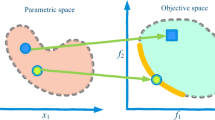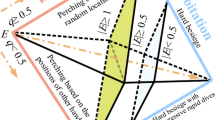Abstract
The Arithmetic Optimization Algorithm (AOA) was recently proposed as a solution for single-objective real continuous problems and has demonstrated superior performance in various contexts. This paper presents a multi-objective version of the algorithm to solve multi-objective problems. The MOAOA employs an archive repository to keep and retrieve the non-dominated solutions produced during optimization. The leaders are then selected from the population archive to lead the solutions of the main population toward the potential search locations. The epsilon-dominance and crowding distance strategies balance the convergence and diversity of the obtained Pareto set. To assess the effectiveness and efficiency of the proposed algorithm, it was tested on various dimensions of multi-objective benchmarks, among them: five unconstrained test functions taken from ZDT-series and four multi-objective constrained tests functions (BNH, SRN, TNK, OSY). Also, it is evaluated on four multi-objective structural design problems, such as welded beam design, speed-reduced design, disk brake design, and four-bar truss design. The algorithm is compared with three algorithms widely used in multi-objectives optimization, such as MSSA, MOEA-D, and MOGWO. The comparison results demonstrate that MOAOA outperforms all other algorithms in terms of both convergence and diversity of solutions, achieving a score of (100%,100%) in the ZDT tests, (75%,50%) in the constrained test functions, and (75%,75%) for the structural design problems.

















Similar content being viewed by others
Data Availability
Data is available from the authors upon reasonable request.
References
Abualigah L, Diabat A (2021) A novel hybrid antlion optimization algorithm for multi-objective task scheduling problems in cloud computing environments. Clust Comput 24:205–223
Abualigah L, Diabat A, Elaziz MA (2021) Improved slime mould algorithm by opposition-based learning and levy ight distribution for global optimization and advances in real-world engineering problems. J Ambient Intell Humaniz Comput 1–40
Abualigah L, Diabat A, Mirjalili S, Abd Elaziz M, Gandomi AH (2021) The arithmetic optimization algorithm. Comput Methods Appl Mech Eng 376:113609
Abualigah L, Habash M, Hanandeh ES, Hussein AM, Shinwan MA, Zitar RA, Jia H (2023) Improved reptile search algorithm by salp swarm algorithm for medical image segmentation. J Bionic Eng 1–25
Abualigah LM, Khader AT, Hanandeh ES (2018) A combination of objective functions and hybrid krill herd algorithm for text document clustering analysis. Eng Appl Artif Intell 73:111–125
Allou L, Zouache D, Amroun K, Got A (2022) A novel epsilondominance harris hawks optimizer for multi-objective optimization in engineering design problems. Neural Comput Appl 34:17007–17036
Dabba A, Tari A, Zouache D (2020) Multiobjective artificial fish swarm algorithm for multiple sequence alignment. INFOR: Inform Sys Oper Res 58:38–59
Deb K, Pratap A, Agarwal S, Meyarivan T (2002) A fast and elitist multiobjective genetic algorithm: Nsga-ii. IEEE Trans Evol Comput 6:182–197
Derrac J, García S, Molina D, Herrera F (2011) A practical tutorial on the use of nonparametric statistical tests as a methodology for comparing evolutionary and swarm intelligence algorithms. Swarm Evol Comput 1:3–18
Emmerich MT, Deutz AH (2018) A tutorial on multiobjective optimization: fundamentals and evolutionary methods. Nat Comput 17:585–609
Ewees AA, Al-qaness MA, Abualigah L, Oliva D, Algamal ZY, Anter AM, Ali Ibrahim R, Ghoniem RM, Abd Elaziz M (2021) Boosting arithmetic optimization algorithm with genetic algorithm operators for feature selection: Case study on cox proportional hazards model. Mathematics 9:2321
Feng Z, Zhang Q, Zhang Q, Tang Q, Yang T, Ma Y (2015) A multiobjective optimization based framework to balance the global exploration and local exploitation in expensive optimization. J Glob Optim 61:677–694
Got A, Zouache D, Moussaoui A (2022) Momrfo: Multi-objective manta ray foraging optimizer for handling engineering design problems. Knowl Based Sys 237:107880
Hemici M, Zouache D, Brahmi B, Got A, Drias H (2023) A decomposition-based multiobjective evolutionary algorithm using simulated annealing for the ambulance dispatching and relocation problem during covid-19. Appl Soft Comput 141:110282
Jangir P, Buch H, Mirjalili S, Manoharan P (2023) Mompa: Multi-objective marine predator algorithm for solving multi-objective optimization problems. Evol Intell 16:169–195
Kahloul S, Zouache D, Brahmi B, Got A (2022) A multi-external archive-guided henry gas solubility optimization algorithm for solving multi-objective optimization problems. Eng. Appl. Artif. Intell 109:104588
Khishe M, Orouji N, Mosavi M (2023) Multi-objective chimp optimizer: An innovative algorithm for multi-objective problems. Expert Syst Appl 211:118734
Laumanns M, Thiele L, Deb K, Zitzler E (2002) Combining convergence and diversity in evolutionary multiobjective optimization. Evol Comput 10:263–282
Li K, Kwong S, Deb K (2015) A dual-population paradigm for evolutionary multiobjective optimization. Inform Sci 309:50–72
Liang J, Ban X, Yu K, Qu B, Qiao K, Yue C, Chen K, Tan KC (2022) A survey on evolutionary constrained multi-objective optimization. IEEE Trans Evol Comput
Mirjalili S (2022) Handbook of moth-flame optimization algorithm: variants, hybrids, improvements, and applications. CRC Press
Mirjalili S, Gandomi AH, Mirjalili SZ, Saremi S, Faris H, Mirjalili SM (2017) Salp swarm algorithm: A bio-inspired optimizer for engineering design problems. Adv Eng Softw 114:163–191
Mirjalili S, Saremi S, Mirjalili SM, Coelho LdS (2016) Multi-objective grey wolf optimizer: a novel algorithm for multi-criterion optimization. Exp Sys Appl 47:106–119
Picheny V (2015) Multiobjective optimization using gaussian process emulators via stepwise uncertainty reduction. Stat Comput 25:1265–1280
Premkumar M, Jangir P, Kumar BS, Sowmya R, Alhelou HH, Abualigah L, Yildiz AR, Mirjalili S (2021) A new arithmetic optimization algorithm for solving real-world multi-objective cec-2021 constrained optimization problems: Diversity analysis and validations. IEEE Access
Qiao K, Yu K, Qu B, Liang J, Song H, Yue C (2022) An evolutionary multitasking optimization framework for constrained multiobjective optimization problems. IEEE Trans Evol Comput 26:263–277
Rahimi I, Gandomi AH, Chen F, Mezura-Montes E (2023) A review on constraint handling techniques for population based algorithms: from single-objective to multi-objective optimization. Arch Comput Methods Eng 30:2181–2209
Sierra MR, Coello CC (2004) A new multi-objective particle swarm optimizer with improved selection and diversity mechanisms. Technical Report of CINVESTAV-IPN
Tanabe R, Ishibuchi H (2018) A decomposition-based evolutionary algorithm for multi-modal multi-objective optimization. In: International conference on parallel problem solving from nature. Springer, pp 249–261
While L, Hingston P, Barone L, Huband S (2006) A faster algorithm for calculating hypervolume. IEEE Trans Evol Comput 10:29–38
Yang S, Li Q, Wei W, Zhang Y (2023) A multi-objective evolutionary algorithm based on mixed encoding for community detection. Multimed Tools Appl 82:14107–14122
Zhang Q, Li H (2007) Moea/d: A multiobjective evolutionary algorithm based on decomposition. IEEE Trans Evol Comput 11:712–731
Zheng R, Jia H, Abualigah L, Liu Q, Wang S (2021) Deep ensemble of slime mold algorithm and arithmetic optimization algorithm for global optimization. Process 9:1774
Zitzler E, Deb K, Thiele L (2000) Comparison of multiobjective evolutionary algorithms: Empirical results. Evol Comput 8:173–195
Zitzler E, Thiele L (1999) Multiobjective evolutionary algorithms: a comparative case study and the strength pareto approach. IEEE Trans Evol Comput 3:257–271
Zouache D, Abdelaziz FB (2022) Guided manta ray foraging optimization using epsilon dominance for multi-objective optimization in engineering design. Expert Sys Appl 189:116126
Zouache D, Abdelaziz FB, Lefkir M, Chalabi NE-H (2021) Guided moth-flame optimiser for multi-objective optimization problems. Ann Oper Res 296:877–899
Zouache D, Arby YO, Nouioua F, Abdelaziz FB (2019) Multi-objective chicken swarm optimization: a novel algorithm for solving multi-objective optimization problems. Comput Ind Eng 129:377–391
Zouache D, Ben Abdelaziz F (2022) Mgde: a many-objective guided differential evolution with strengthened dominance relation and bi-goal evolution. Ann Oper Res 1–38
Zouache D, Got A, Drias H (2023) An external archive guided harris hawks optimization using strengthened dominance relation for multi-objective optimization problems. Artif Intell Rev 56:2607–2638
Zouache D, Moussaoui A, Abdelaziz FB (2018) A cooperative swarm intelligence algorithm for multi-objective discrete optimization with application to the knapsack problem. Eur J Oper Res 264:74–88
Funding
Not Applicable
Author information
Authors and Affiliations
Corresponding author
Ethics declarations
Ethical approval
This article does not contain any studies with human participants or animals performed by any of the authors.
Informed consent
Informed consent was obtained from all individual participants included in the study.
Conflicts of interest
The authors declare that there is no conflict of interest regarding the publication of this paper.
Additional information
Publisher's Note
Springer Nature remains neutral with regard to jurisdictional claims in published maps and institutional affiliations.
Rights and permissions
Springer Nature or its licensor (e.g. a society or other partner) holds exclusive rights to this article under a publishing agreement with the author(s) or other rightsholder(s); author self-archiving of the accepted manuscript version of this article is solely governed by the terms of such publishing agreement and applicable law.
About this article
Cite this article
Zouache, D., Abualigah, L. & Boumaza, F. A guided epsilon-dominance arithmetic optimization algorithm for effective multi-objective optimization in engineering design problems. Multimed Tools Appl 83, 31673–31700 (2024). https://doi.org/10.1007/s11042-023-16633-x
Received:
Revised:
Accepted:
Published:
Issue Date:
DOI: https://doi.org/10.1007/s11042-023-16633-x




